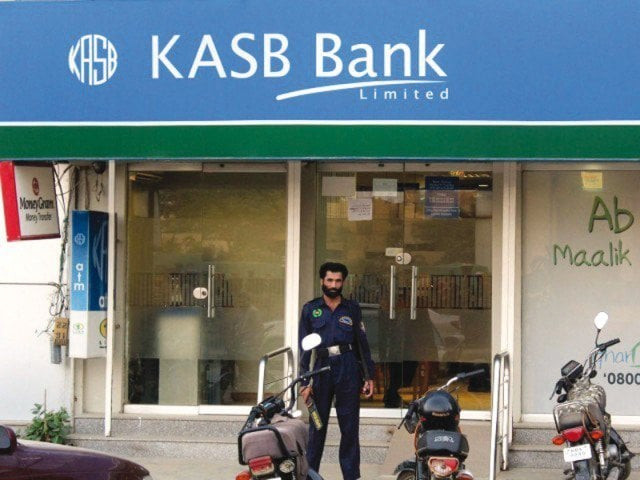NAB to step up probe into KASB-BankIslami merger
It accuses SBP officials of giving undue favour to BankIslami

KASB Bank branch. PHOTO: PPI
The Executive Board of the National Accountability Bureau (NAB) on Wednesday decided to turn an ongoing inquiry into the conduct of officials of the SBP, BankIslami and AF Ferguson into investigation.
An official statement released by NAB stated that the accused allegedly misused their authority in terms of non-transparent amalgamation of KASB Bank into BankIslami and granted Rs20 billion in concessionary loan for the purpose, causing a loss of billions of rupees to the national exchequer.
BankIslami ‘unduly favoured’ in KASB deal: AGP
However, the SBP denied these allegations, saying it took the merger decision due to KASB Bank’s constant failure to meet the minimum capital requirement.
It is NAB’s second decision that would have implications for the financial sector. Earlier, it decided to file a reference in the case of Rs18.5-billion fraud in the Bangladesh branch of National Bank of Pakistan.
Before the scheduled board meeting, NAB faced intense pressure from various quarters to drop the investigation, said officials. The inquiry officer, NAB director general operations and its chairman decided to take the case to the next step after going through the record.
If the allegations levelled in the inquiry report are proved at the investigation stage and NAB gets hold of incriminating evidence, the next step will be the filing of a reference against the accused.
The NAB inquiry report has named former SBP governor Ashraf Wathra, Executive Director Banking Policy Syed Irfan Ali, Director Shoukat Zaman, Deputy Director Arshad Mehmood, Deputy Director Nadeem Ahmed Jami, Deputy Director Muhammad Saleem and Deputy Director Shahid Ashraf as accused in the case.
It also named two officials of AF Ferguson - Asad Nazir and Asim Salim - in the case.
According to officials, the decision to include BankIslami officials in NAB probe was taken by the NAB headquarters.
However, central bank officials said they were not considering taking action against its officials, arguing that this might send wrong signals and could become a cause of delay in decisions related to the banking sector.
The SBP was also not considering any action against AF Ferguson and BankIslami at this stage, said the sources. The response of SBP Chief Spokesman Abid Qamar was awaited till the filing of this report.
In its report, the Auditor General of Pakistan has pointed out that the central bank sustained Rs435 million worth of losses due to the grant of a Rs15-billion concessionary loan to BankIslami.
In order to help BankIslami, the SBP gave two separate loans at concessionary rates, which caused Rs3.4-billion loss to the exchequer.
So far, main findings of NAB are that the selection of AF Ferguson and signing of a tripartite agreement was an illegal act on the part of the SBP, which misused the authority under Section 47 of BCO.
Despite $100m investment offer, why was KASB Bank sold for Rs1,000?
It added officers of the SBP and others misused their authority to refuse foreign investment of $100 million in KASB Bank and favoured BankIslami by amalgamating KASB Bank into it at a token price of Rs1,000 only, which caused a huge loss to shareholders.
Assets of KASB Bank were not valued at market rate to favour BankIslami and a concessionary loan to the latter, amounting to Rs20 billion, after amalgamation established that BankIslami was not in a position to bear the losses of KASB Bank, according to the inquiry report.
AF Ferguson had been hired to evaluate KASB Bank despite the fact that the company was also an external auditor of the SBP. Officials said AF Ferguson was cooperating with NAB authorities in their probe.
The Institute of Chartered Accountants of Pakistan - the apex regulatory body of accountants - has also done nothing in the case and decided to stop its probe after the SBP did not cooperate, said the officials.
Published in The Express Tribune, October 6th, 2017.
Like Business on Facebook, follow @TribuneBiz on Twitter to stay informed and join in the conversation.



















COMMENTS
Comments are moderated and generally will be posted if they are on-topic and not abusive.
For more information, please see our Comments FAQ